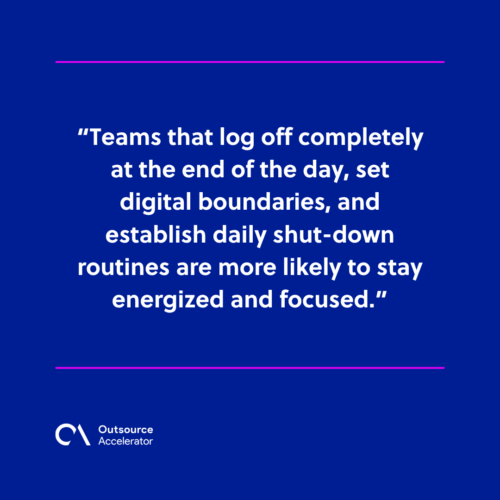The power of deep work: 6 ways to maximize team productivity

A team spends hours responding to emails, hopping between Slack messages, and attending back-to-back meetings, yet by day’s end, little meaningful progress is made. This kind of shallow work chips away at productivity, leaving teams overwhelmed and creatively drained.
When distractions dominate the workday, innovation slows, collaboration weakens, and deadlines slip. High-performing teams succeed not by doing more, but by working with focus and intention.
That’s where the concept of deep work becomes essential. This article explores the power of deep work and outlines six practical ways teams can shift from busywork to impactful output.
Discover how focused effort transforms team dynamics, drives better results, and builds a culture of sustained productivity.
What is deep work?
Deep work is the ability to focus without distraction on cognitively demanding tasks. This phrase is coined by Cal Newport, a computer science professor and author of Deep Work: Rules for Focused Success in a Distracted World.
The concept highlights a state where the brain operates at full capacity, allowing individuals to learn complex concepts and produce high-quality results efficiently.
Deep work involves dedicating intentional, uninterrupted time to meaningful projects, free from constant notifications and multitasking.
In contrast, shallow work includes routine, easily replicable tasks such as checking emails, managing calendars, or coordinating logistics, activities that often happen while distracted.
These tasks, while necessary, offer minimal long-term value and rarely push boundaries. Teams that prioritize deep work carve out space for innovation and progress.

Why is deep work harder to achieve?
Deep work requires full attention, but most modern workplaces and digital habits make sustained focus difficult. Below are common obstacles that stand in the way of achieving it consistently:
Always-on expectations
Many teams operate in an “always-on” culture. The constant stream of messages through email, chat apps, and project tools creates a sense of urgency.
When teammates send requests, there’s often pressure to respond immediately. This mindset keeps teams in reaction mode.
While fast replies may help coordination, they interrupt focus and keep people stuck in shallow tasks. The more often workers switch contexts, the harder it becomes to engage in meaningful work.
Relentless digital distractions
Even outside of work conversations, technology remains a major barrier. Social apps, news alerts, and personal messages are always within reach.
Notifications break concentration before deep focus can develop. As attention is pulled in multiple directions, progress on demanding tasks slows or comes to a complete halt.
Lack of boundaries
Many professionals struggle to protect time for focused work. Without clear limits on meetings, notifications, or communication windows, deep work gets pushed aside.
Teams that don’t set boundaries risk losing time to low-value tasks, leaving little room for strategic, impactful work.
Deep work: 6 actionable tips for a more focused team
Building a culture of deep work doesn’t happen overnight. Like any skill, focused work requires intention, structure, and regular practice.
Here are six practical strategies to support deeper, more meaningful work:
1. Pick a peep work philosophy that fits
Every team operates differently, so choosing the right deep work model is essential. Cal Newport outlines four approaches:
- Rhythmic – daily deep work blocks
- Journalistic – fitting deep work into available gaps
- Monastic – cutting out shallow work entirely
- Bimodal – dedicating entire days to focus
For teams with recurring meetings, a rhythmic schedule, such as two hours of deep work each morning, offers consistency. Others may benefit from No Meeting Days or rotating “focus hours” to carve out uninterrupted time.
2. Build rituals that trigger focus
Simple habits can train the brain to enter a state of focus more easily. Teams can create shared rituals, like:
- Clearing desks
- Turning off notifications
- Starting deep work sessions with calming music
A designated workspace, consistent start times, and focus-friendly environments help signal to the brain that it’s time to concentrate. These cues remove friction and make deep work more accessible.
3. Prioritize work that actually matters
Trying to do everything at once spreads focus thin. Productive teams identify what truly moves the needle. Before every deep work session, select one high-impact task.
Use goal-setting frameworks like OKRs or SMART goals to keep priorities aligned. When everyone knows what matters most, the team avoids distraction and channels energy into meaningful outcomes.
4. Track and structure time intentionally
Without visibility into how time is spent, shallow work quickly fills the day. Teams can audit their schedules and categorize tasks to understand what’s consuming the most attention.
Then, use timeboxing or time blocking to make space for deep work. Regularly reviewing meetings and reducing non-essential ones also helps reclaim time for focused output.
5. Eliminate digital distractions
Pop-up notifications, app-switching, and multitasking erode focus. Encourage team members to silence notifications, close unnecessary tabs, and use “Do Not Disturb” modes during deep work blocks.
Consolidating tools into a single platform helps reduce context switching and keeps work streamlined.
6. Protect time to recharge
Sustainable deep work requires rest. Teams that log off completely at the end of the day, set digital boundaries, and establish daily shut-down routines are more likely to stay energized and focused. Recovery fuels long-term creativity, motivation, and resilience.
Structured focus leads to meaningful progress. These six strategies help any team cultivate the deep work habits needed to do their best work.

Deep work: Common FAQs
Deep work helps professionals make meaningful progress in less time. Let’s address some of the most frequently asked questions about deep work:
How much deep work is possible?
Most people can engage in deep work for two to four hours a day. This period allows the brain to operate at its highest level before fatigue sets in. Trying to extend beyond this range often leads to diminishing returns.
What are the benefits of deep work?
Deep work boosts productivity, enhances learning, and improves problem-solving. It also leads to greater job satisfaction because it enables individuals to create valuable output and experience progress in their craft.
How to practice deep work?
Start by setting a clear schedule and removing distractions like social media or email. Use time blocks for focused sessions, and take meaningful breaks to recover. Consistency builds mental stamina over time.
Building a deep work habit takes time, but the long-term rewards are significant. With regular practice, anyone can sharpen their focus and achieve more meaningful results.







 Independent
Independent




